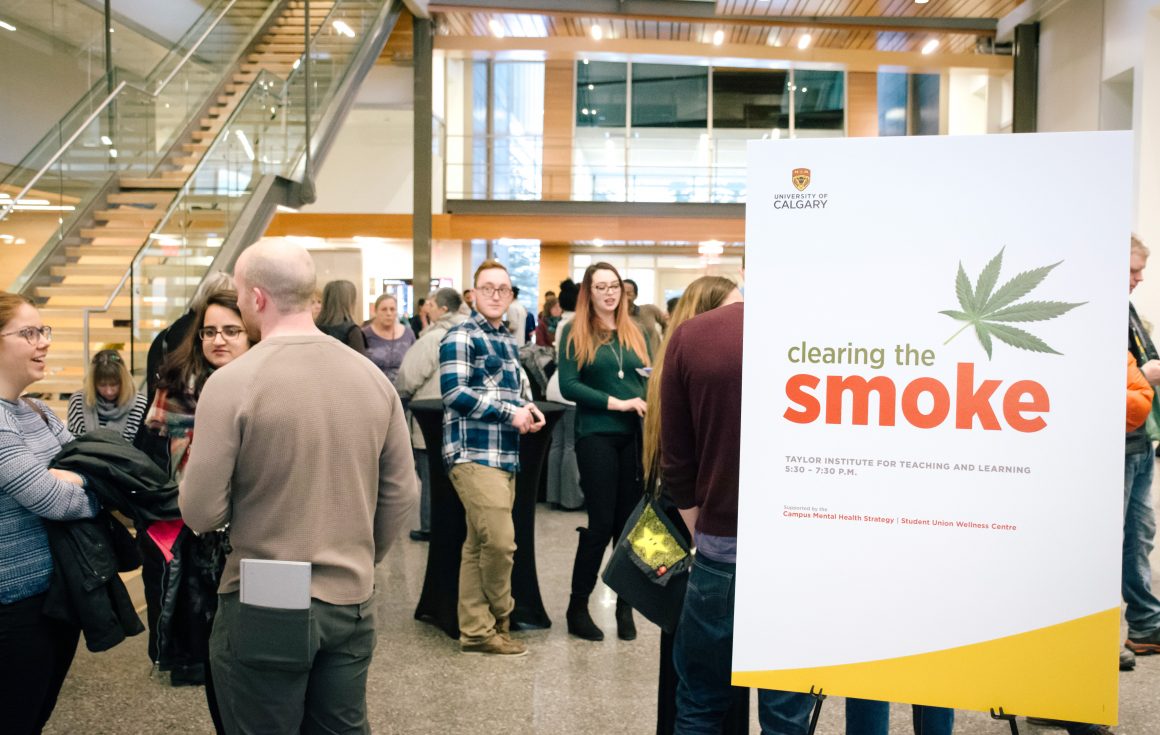
U of C tackle marijuana legalization with on-campus forum
By Justin Schellenberg, February 13 2018 —
The University of Calgary held a forum on Feb. 5 to discuss the future legalization of recreational marijuana and its potential impacts on society.
The event, titled “Clearing the Smoke about Cannabis,” aimed to provide research-based evidence on issues surrounding the substance. Four speakers presented their findings, followed by a question-and-answer period.
Fiona Clement, director of the health technology assessment unit at the O’Brien Institute for Public Health, has assisted the provincial government in their work on research for cannabis legislation.
Clement said that Alberta is ahead of other provinces in terms of evidence gathering and policy creation.
“Alberta was very forward-thinking compared to some other policy files that I’ve worked on,” Clement said. “We undertook a massive evidence synthesis, the largest that I’ve ever worked on.”
According to Clement, Alberta’s approach to cannabis legalization is centred around four key points: promoting responsible use for all those who choose to partake, protecting public health, promoting safety on roads, in workplaces and in public spaces and limiting the illegal cannabis market.
“We’re talking about moving to legalization where all aspects of the market will be legal, similar to what we might see for alcohol, or milk for that matter,” Clement said.
Uruguay is currently the only country that fully legalized the use of recreational marijuana. Canada will be the second country to do so.
“We are going to be among the first here. We are going to need to watch, learn and respond quickly to positive and negative trends and outcomes that we’re seeing,” Clement said. “We’re living through a very large social change. In my lifetime, this will probably be the largest social change that I see.”
Matt Hill, the assistant director at the U of C’s Hotchkiss Brain Institute, spoke about how former tests regarding cannabis use reflect flawed approaches. He said that many of the tests were executed using synthetic cannabis substances, which are more potent and affect cellular processes differently than pure cannabis.
“We understand that these drugs are fundamentally extremely different,” Hill said. “There have actually been numerous fatalities associated with using [synthetic cannabis], despite the fact that throughout history, there has never been a recorded fatality associated with cannabis.”
Hill said more recent studies have corrected for this issue and also take into account other components of cannabis, including cannabidiol, which is claimed to be responsible for many of the health benefits related to marijuana use.
“The idea that cannabis use as a teenager causes this persistent deficit in neurological functioning, I would say at this point, has been largely debunked,” he said. “People who are perpetuating this are just leading misinformation around.”
The third speaker was Rebecca Haines-Saah, an assistant professor of community health services. She aimed to debunk cannabis’s negative reputation.
“The status quo hasn’t been working, now we’re going to try something different,” Haines-Saah said. “We have overwhelming evidence that putting people in jail for cannabis has not been effective in deterring use whatsoever.”
Haines-Saah also addressed the concerns of the underrage use of cannabis, noting that it will still be illegal for youth to possess marijuana, but that will not be changed if caught with under five grams.
“You’ll have your parent or guardian called, you’ll have a cannabis use charge and you’ll get a ticket, much like we do for alcohol currently,” Haines-Saah said.
Not all the speakers were on the pro-side of the cannabis issue. U of C professor and division chief of child and adolescent psychiatry Chris Wilkes talked about his concerns regarding marijuana use.
“Cannabis is not without risk,” Wilkes said. “We certainly see a worsening of people’s mental state if they continue to use high-potency marijuana.”
Wilkes said that people between the ages of 18–25 are still developing cognitively and are at risk of negative effects from the use of cannabis.
“I would not be doing my colleagues justice if I did not emphasize that many medical practising physicians and psychiatrists are very concerned that this has been promoted as a safe alternative to alcohol,” Wilkes said. “If you look at specific population risk factors this is not correct and you are promoting mental health crises through the use of cannabis.”
During the question period, the speakers were asked about how legalization will affect student use on campus. Those who responded said though the law wouldn’t prevent students being intoxicated on campus, it was recommended they not use cannabis while at the university.
“There is definitely evidence that acute intoxication impairs memory performance,” Hill said. “If you try and go learn information, getting high before you go is probably not in your benefit.”
The Canadian federal government plans to legalize marijuana by July 1.
